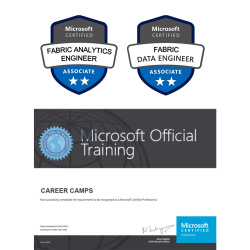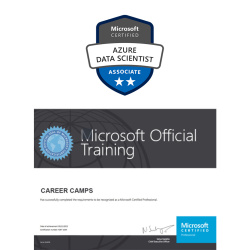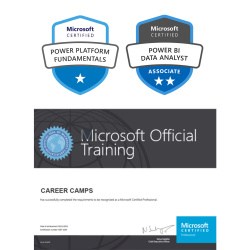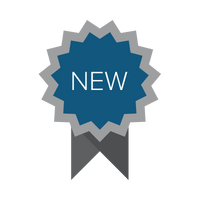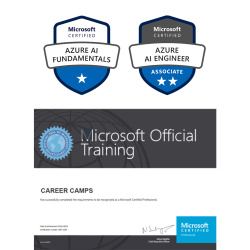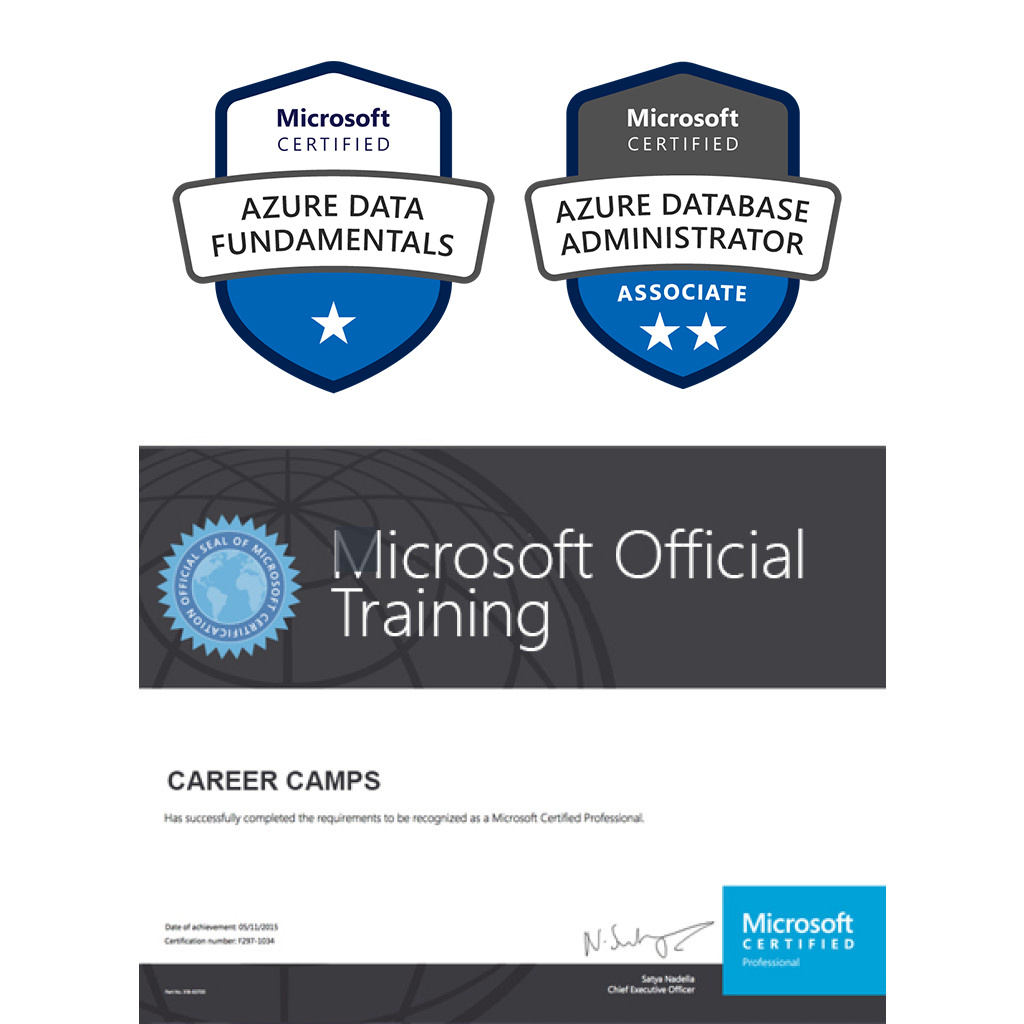
MCA Microsoft Azure Database Administrator Certification Camp (2 Courses, 2 Exams, 2 Certs)
$3,495.00
Career Camps provides the most comprehensive training and certification for Microsoft Azure Database services. During this structured, 5-day instructor-led live course, students cover both Database Fundamentals (DP-900) and Administering Relational Databases on Microsoft Azure (DP-300). This hands-on boot camp focuses on the practical, real-world duties of an Azure Database Administrator and thoroughly prepares students for the related certification exams.
We also offer the MCA Microsoft Fabric Analytics Engineer + MCA Microsoft Fabric Data Engineer Associate Certification Camp as an alternative to this Azure Data Certification.
EXAMS INCLUDED
DP-900: Microsoft Azure Data Fundamentals
DP-300: Administering Relational Databases on Microsoft Azure
WHAT IS INCLUDED
| Airfare to/from Sarasota, FL | |
| 6 Nights of Lodging | |
| Ground Transportation | |
| Microsoft Training Books | |
| 2 Microsoft Exam Vouchers | |
| 1 Retake Voucher (per exam, if needed) | |
| Onsite Pearson Vue Test Center | |
| Microsoft Study Labs & Simulations |
LOCATIONS
Career Camps primary Microsoft Training campus (for individual students) is located in Sarasota, FL. Can’t travel to our facility? No problem! You will save on airfare, lodging and transportation. Just contact us and we will get you pricing to attend the class online live virtually from your work or home. If you do not see the location or class you are looking for, let us know! We have access to hundreds of classes and locations all across the United States and also offer corporate and group rates. If you have 5 or more students we can even come to you! With several partnerships in place, we are sure to have something to fit your needs. Whether you need to get MCA or MCE Certified, or get updated on Microsoft Windows Server 2022, we’ve got you covered.
- Description
- Additional information
- Our Facilities
- Why Choose Us
- Microsoft Azure Certifications
- Microsoft Gold Learning Partner
Description
The Microsoft Azure Database Administrator Training & Certification 5-Day Boot Camp equips students with the knowledge and skills required to manage SQL Server database infrastructures across cloud, on-premises, and hybrid environments. It also covers Microsoft’s PaaS relational database offerings. This course is designed for data professionals responsible for managing data and databases who want to deepen their expertise in administering Microsoft Azure’s data platform technologies. Additionally, the camp provides a brief introduction to Azure data fundamentals.
While attending this 5 day instructor led live camp – students will take two exams (DP-300 / DP-900) to achieve the Microsoft Certified Associate Database Administrator certification. This hands on, instructor led live camp focuses on the real world responsibilities of an Azure Database Administrator covering the information needed for the certification exams which are administered while attending.
The Microsoft Certified Azure Database Administrator boot camp is taught using Microsoft Official Courseware –
DP-900T00: Microsoft Azure Data Fundamentals
DP-300T00: Administering Relational Databases on Microsoft Azure
Skills Gained:
Describe core data concepts in Azure
Explain concepts of relational data in Azure
Explain concepts of non-relational data in Azure
Identify components of a modern data warehouse in Azure
Plan, deploy and configure Azure SQL offerings
Monitor database performance and tune a database and queries for optimum performance
Plan and configure a High Availability Solution
Topics Covered in this Official Boot Camp:
The Role of the Azure Database Administrator
This module explores the role of a database administrator in the world of Azure. It also provides some foundational information relevant to the overall content. This includes a review of the various SQL Server-based options (SQL Server in a VM, Managed Instances, and Azure SQL Database.) Students will learn why compatibility level is a crucial concept when working with SQL databases in Azure. Students are also introduced to other database platforms available on Azure in addition to those based on SQL Server, in particular PostgreSQL and MySQLLessons
Azure Data Platform Roles
Azure Database Platforms and Options
SQL Server Compatibility Levels
Azure Preview Features
Lab : Using the Azure Portal and SQL Server Management Studio
Provision a SQL Server on an Azure Virtual Machine
Connect to SQL Server and Restore a Backup
After completing this module, students will:
Understand the role of Azure Database Administrator as it fits in with other data platform roles
Be able to describe the key differences between the SQL Server-based database op
Be able to describe the difference between versions and compatibility levels
Know how to enable and disable preview features
Plan and Implement Data Platform Resources
Lessons
Deploying SQL Server using IaaS
Deploying SQL Server using PaaS
Deploying Open Source Database Solutions on Azure
Lab : Deploying Azure SQL Database
Deploy a VM using an ARM template
Configure resources needed prior to creating a database
Deploy an Azure SQL Database
Register the Azure SQL Database instance in Azure Data Studio and validate connectivity
Deploy PostgreSQL or MySQL using a client tool to validate connectivity
Implement a Secure Environment
Lessons
Configure Database Authentication
Configure Database Authorization
Implement Security for Data at Rest
Implement Security for Data in Transit
Implement Compliance Controls for Sensitive Data
Lab : Implement a Secure Environment
Configure a server-based firewall rule using the Azure Portal
Authorize Access to Azure SQL Database with Azure Active Directory
Enable Advanced Data Security and Data Classification
Manage access to database objects
Monitor and Optimize Operational Resources
Lessons
Baselines and Performance Monitoring
Major Causes of Performance Issues
Configuring Resources for Optimal Performance
User Database Configuration
Performance-related Maintenance Tasks
Lab : Monitor and Optimize Resources
Isolate CPU Problems
Use Query Store observe blocking problems
Detect and correct fragmentation issues
Optimize Query Performance
Lessons
Understanding SQL Server Query Plans
Explore Performance-based Database Design
Evaluate Performance Improvements
Lab : Query Performance Troubleshooting
Identify issues with database design AdventureWorks2017
Isolate problem areas in poorly performing queries in AdventureWorks2017
Use Query Store to detect and handle regression in AdventureWorks2017
Use query hints to impact performance in AdventureWorks2017
Automation of Tasks
Lessons
Setting up Automatic Deployment
Defining Scheduled Tasks
Configuring Extended Events
Managing Azure PaaS resources Using Automated Methods
Lab : Automating Tasks
Deploy an Azure template from a Quickstart template on GitHub
Configure notifications based on performance metrics
Deploy an Azure Automation Runbook (or elastic job) to rebuild indexes on an Azure SQL Database
Plan and Implement a High Availability and Disaster Recovery Environment
Lessons
High Availability and Disaster Recovery Strategies
IaaS Platform and Database Tools for HADR
PaaS Platform and Database Tools for HADR
Database Backup and Recovery
Lab : Plan and Implement a High Availability and Disaster Recovery Environment
Create an Always On Availability Group
Enable Geo-Replication for Azure SQL Database
Backup to URL and Restore from URL
Azure Data Foundations
Describe core data concepts
Describe how to work with relational data on Azure
Describe how to work with non-relational data on Azure
Describe an analytics workload on Azure
Explore core data concepts
Students will learn the fundamentals of database concepts in a cloud environment, get basic skilling in cloud data services, and build their foundational knowledge of cloud data services within Microsoft Azure. Students will identify and describe core data concepts such as relational, non-relational, big data, and analytics, and explore how this technology is implemented with Azure. Students will explore the roles, tasks, and responsibilities in the world of data.
Lessons
Explore core data concepts
Explore roles and responsibilities in the world of data
Describe concepts of relational data
Explore concepts of non-relational data
Explore concepts of data analytics
After completing this module, students will be able to:
Show foundational knowledge of cloud data services within Azure
Identify and describe core data concepts such as relational, non-relational, big data, and analytics
Explain how this technology is implemented with Azure
Explore relational data in Azure
Students will learn the fundamentals of database concepts in a cloud environment, get basic skilling in cloud data services, and build their foundational knowledge of cloud data services within Microsoft Azure. Students will explore relational data offerings, provisioning and deploying relational databases, and querying relational data through cloud data solutions with Azure.
Lessons
Explore relational data services in Azure
Explore provisioning and deploying relational database services in Azure
Query relational data in Azure
After completing this module, students will be able to:
Describe relational data services on Azure
Explain provisioning and deploying relational databases on Azure
Query relational data through cloud data solutions in Azure
Explore non-relational data in Azure
Students will learn the fundamentals of database concepts in a cloud environment, get basic skilling in cloud data services, and build their foundational knowledge of cloud data services within Azure. Students will explore non-relational data services, provisioning and deploying non-relational databases, and non-relational data stores with Microsoft Azure.
Lessons
Explore non-relational data services in Azure
Explore provisioning and deploying non-relational data services on Azure
Manage non-relational data stores in Azure
After completing this module, students will be able to:
Describe non-relational data services on Azure
Explain provisioning and deploying non-relational databases on Azure
Describe non-relational data stores on Azure
Explore modern data warehouse analytics in Azure
Students will learn the fundamentals of database concepts in a cloud environment, get basic skilling in cloud data services, and build their foundational knowledge of cloud data services within Azure. Students will explore the processing options available for building data analytics solutions in Azure. Students will explore Azure Synapse Analytics, Azure Databricks, and Azure HDInsight. Students will learn what Power BI is, including its building blocks and how they work together.
Lessons
Examine components of a modern data warehouse
Explore data ingestion in Azure
Explore data storage and processing in Azure
Get started building with Power BI
After completing this module, students will be able to:
Describe processing options available for building data analytics solutions in Azure
Describe Azure Synapse Analytics, Azure Databricks, and Azure HDInsight
Explain what Microsoft Power BI is, including its building blocks and how they work together
Additional information
| Class Dates | 12/08/2025 – 12/12/2025 – Sarasota, FL, 01/12/2026 – 01/16/2026 – Sarasota, FL, 02/09/2026 – 02/13/2026 – Sarasota, FL, 03/09/2026 – 03/13/2026 – Sarasota, FL |
|---|
Our Facilities
CAREER CAMPS FACILITIES

CLASSROOM EQUIPMENT – Students work on a dedicated Dell Client Desktop with 32GB memory with 512GB SSD drives – All Labs are executed the extremely fast Microsoft Data Center Hosted Lab Environment.
CAMPUS INTERNET – The campus is connected with a 1Gbps (1,000 Mbps) Verizon Fios Business Connection which provides complete internet (including VPN) access for students.
COMMON AREA – Amenities including snacks, drinks (Coffee, 100% juices, sodas, etc) all complimentary.
LODGING – We use the Hyatt Place Lakewood Ranch. This “upgraded” hotel offers extremely comfortable beds, great breakfast and very fast internet access.
NEAR BY AMENITIES – Many shops, restaurants and grocery options are available within walking distance. Additionally – the hotel provided scheduled shuttle services. Restaurants like Bone Fish Grill, Ruby Tuesday’s, Five Guys, Chipotle, Quiznos, Chili’s and over 20 additional choices in the immediate area. All of these options are offered in a pedestrian walking village.
Why Choose Us
CAREER CAMPS DIFFERENCE
Career Camps provides an in-depth hands on learning environment. Our instructors teach using demonstrations and explain concepts beyond the scope of the courseware. The best instructors are contracted from all across the US. These professionals are real world consultants who actually implement these technologies. Career Camps knows our clients work in the “real world” and it only makes sense to have an instructor with the experience in the real world.
Facilities – Many of our competitors over-crowd classrooms by placing 2 to 3 students per desk and 20+ students per instructor. Often these companies “extend” the life of very old equipment with slow performance on the software used today. Our average class size is 8 students. Our facilities have the best equipment with the most comfortable, focused environment for learning.
Instructors – Our CEO, Chester Flake holds one of the rarest Microsoft Certifications – the Microsoft Certified Learning Consultant (MCLC) Certification. This certification reflects a commitment to make sure our instructors are also actively engaged in real world consulting projects. Students expect a professional who can answer questions and demonstrate the technology.
Face to Face Training – We believe the best way to interact and learn is face to face training. Many of our competitors which offer local training are simply providing students with headphones/mic to attend class with an instructor at a remote location.
Test Pass – We offer a free retake voucher (if needed) for each of the exams required for certification. Any training center offering a “100% pass guarantee” would have to use unethical practices or unlimited test vouchers (which is not likely or practical).
Distractions – Students often look for a “local” training center so they can be close to home and work. Boot camp requires a tremendous time commitment during the program. Long class hours combined with self study each evening. The goal of boot camp is to achieve certification in a fraction of the time. We strongly recommend students attend camp away from home and work in a focused, distraction free environment.
Boot Camp – Boot camp is an accelerated training focused on teaching technology and testing students on the official exams. Most training providers “added” boot camps to the existing standard training classes they offer. These training centers think a boot camp is just a regular class where you send the student home with a voucher on the last day. Career Camps administers exams throughout the camp. Equally important – not every trainer can teach a boot camp and not all courseware is designed for boot camp format. Our trainers know the boot camp format and our courseware is designed for accelerated learning.
Florida – Career Camps has one of the most scenic locations boasting some of the best weather in US. We believe students should have a comfortable and inviting atmosphere while attending these otherwise intense programs. We place our location, facilities and amenities up against that any competitor.
Microsoft Azure Certifications
Microsoft Job Role-based Azure Certifications
Microsoft has aligned Azure certifications and training to job roles – focusing on Admin, Dev or Architect.
Each certification requires 2 exams and no certification has any prerequisite certification requirements.
Microsoft Gold Learning Partner
Career Camps has developed a comprehensive training / delivery format which focuses on learning beyond the core content accessible to any Microsoft training provider. Our program incorporates interactive demonstrations with explanations which go beyond the content of the book. Additional content, videos, labs & demonstrations are provided to expand on advanced topics – providing additional insight and perspective.
Career Camps training is not the typical book & PowerPoint presentation found at any local training center.
As a Microsoft Certified Partner with Gold Learning Competency – we adhere to the strict guidelines, standards and requirements to use Microsoft’s exclusive curriculum. More over – our standards go beyond the “minimum requirements” set forth by Microsoft Learning.
We leverage our partnership benefits of courseware customization to build end to end technology training solutions. Students gain practical skills which can be implemented immediately.
At most training centers – learning starts on the first day of class and ends on the last day. Our boot camp training program is designed to offer resources before, during and after.
You May Also Like:
Related products
-
MCA Microsoft Fabric Analytics Engineer + MCA Microsoft Fabric Data Engineer Associate Certification Camp (2 Courses, 2 Exams, 2 Certs)
$4,995.00 Select options This product has multiple variants. The options may be chosen on the product page -
MCA Microsoft Azure Data Scientist Associate Certification Camp (1 Course, 1 Exam, 1 Cert)
$2,495.00 Select options This product has multiple variants. The options may be chosen on the product page -
MCA Microsoft Power BI Data Analyst Associate Certification Camp (2 Courses, 2 Exams, 2 Certs)
$3,995.00 Select options This product has multiple variants. The options may be chosen on the product page -
MCA Microsoft Azure AI Engineer Associate (w/ Azure AI Fundamentals) Certification Camp (2 Courses, 2 Exams, 2 Certs)
$3,995.00 Select options This product has multiple variants. The options may be chosen on the product page




